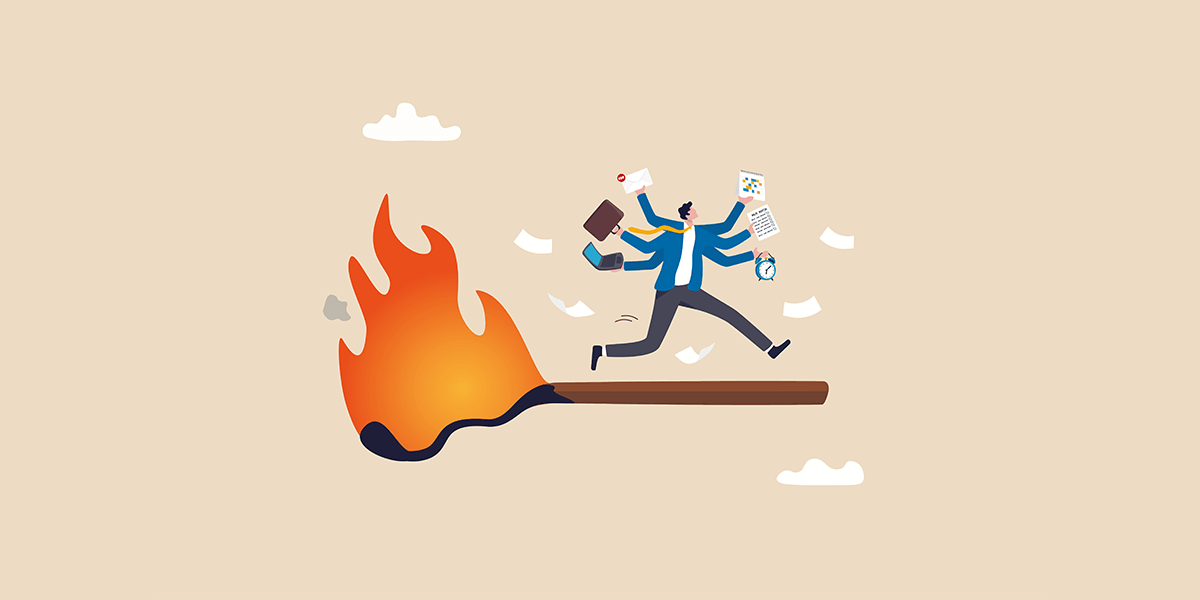Preventing Burnout: Strategies for Sustainable Success

Burnout is a growing concern in the modern workplace, with 76% of employees reporting they have experienced it (Gallup), and one in three facing severe symptoms that affect their performance.
The impact extends far beyond the office—undermining productivity, health, and overall career satisfaction. In today’s demanding corporate environment, recognising and addressing burnout is critical for maintaining long-term success and well-being.
Let’s explore how high-performing professionals sustain their energy, focus, and resilience.
Understanding the Corporate Burnout Cycle
Burnout is more than fatigue; it’s a progressive condition stemming from prolonged workplace stress. Recognised by the WHO as a workplace phenomenon in 2019, burnout often originates in high-pressure environments. Research highlights systemic triggers such as long work hours, lack of control, and insufficient recognition. Remote work has also blurred boundaries, extended workdays, and contributed to stress.
Impact on Professional Performance
Burnout significantly affects your ability to perform, with outcomes including:
- Declining work quality and increased errors
- Reduced creativity and focus
- Missed deadlines and poor decision-making
- Higher risks of mental health conditions like depression
Organisations also feel the strain, with stress-related issues costing billions annually and a driving high employee turnover.
Building Sustainable Work Habits
The key to burnout prevention lies in cultivating habits that sustain productivity and energy.
Implementing the 90-Minute Focus Block Method
Research shows peak focus lasts 90 minutes before a break is needed. Use this method to structure your day:
- Prioritise challenging tasks during energy highs.
- Work in 90-minute focus blocks.
- Take 10-minute breaks to recharge.
- Aim for 3–4 blocks of focused work daily.
Designing Recovery Periods Between Projects
Taking time to recover after major projects is essential. A week-long break after a significant initiative allows you to:
- Wrap up outstanding tasks
- Celebrate milestones
- Recharge your mental and physical energy
Building Resilience and Managing Energy
Resilience is a learnable skill that protects against burnout. Instead of only managing time, focus on energy through strategic breaks, mindfulness, and routines that promote recovery.
- Leading with Emotional Intelligence Short Course: Learn to manage emotions, navigate challenges, and foster stronger workplace relationships.
- Microcredential in Developing and Applying Emotional Intelligence: Gain a broader depth of practical skills to lead a team driving sustainable success
- Mindful Leader: Cultivate focus, reduce stress, and improve decision-making.
- Diploma of Leadership and Management (BSB50420): For leaders who want to foster healthier team dynamics and manage workloads to reduce stress
Leverage Professional Support Systems
Strong networks and accessible resources are invaluable for managing stress.
Mentors and Peer Support Circles
Research shows 91% of employees with mentors report higher job satisfaction (CNBC). Build a diverse network of mentors and join peer circles to share experiences and strategies.
Employee Assistance Programs (EAPs)
Many workplaces offer confidential counselling, work-life balance resources, and crisis support through EAPs. Though often overlooked, these services are invaluable when dealing with stress.
Prevent Burnout with Proactive Strategies
Burnout prevention requires consistent effort, strategic habits, and support systems. Consider short courses like Personal Health and Wellbeing at Work or Planning and Prioritising to build skills that enhance resilience and productivity.
By recognising the signs early and adopting these strategies, you can maintain energy, protect your well-being, and achieve long-term success.
References
- CNBC. (2024, April 5). 91% of workers who do this 1 thing are satisfied with their jobs. Retrieved from https://www.cnbc.com/2024/04/05/91percent-of-workers-who-do-this-1-thing-are-satisfied-with-their-jobs.html
(Survey conducted in partnership with SurveyMonkey.) - Gallup. (2024). Uncomfortable but necessary: How conversations can prevent burnout. Retrieved from https://www.gallup.com/workplace/406232/uncomfortable-necessary-conversations-burnout.aspx



